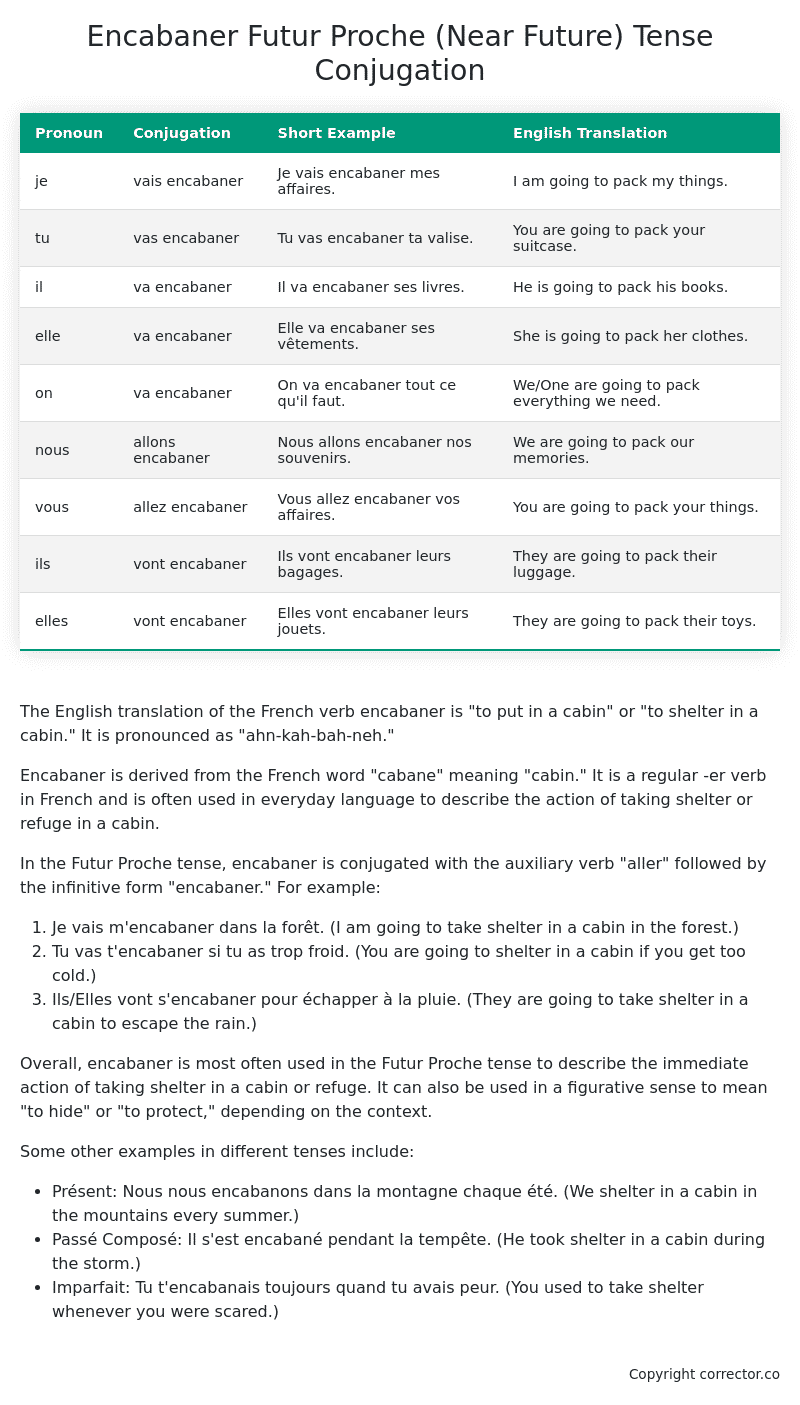Futur Proche (Near Future) Tense Conjugation of the French Verb encabaner
Introduction to the verb encabaner
The English translation of the French verb encabaner is “to put in a cabin” or “to shelter in a cabin.” It is pronounced as “ahn-kah-bah-neh.”
Encabaner is derived from the French word “cabane” meaning “cabin.” It is a regular -er verb in French and is often used in everyday language to describe the action of taking shelter or refuge in a cabin.
In the Futur Proche tense, encabaner is conjugated with the auxiliary verb “aller” followed by the infinitive form “encabaner.” For example:
- Je vais m’encabaner dans la forêt. (I am going to take shelter in a cabin in the forest.)
- Tu vas t’encabaner si tu as trop froid. (You are going to shelter in a cabin if you get too cold.)
- Ils/Elles vont s’encabaner pour échapper à la pluie. (They are going to take shelter in a cabin to escape the rain.)
Overall, encabaner is most often used in the Futur Proche tense to describe the immediate action of taking shelter in a cabin or refuge. It can also be used in a figurative sense to mean “to hide” or “to protect,” depending on the context.
Some other examples in different tenses include:
- Présent: Nous nous encabanons dans la montagne chaque été. (We shelter in a cabin in the mountains every summer.)
- Passé Composé: Il s’est encabané pendant la tempête. (He took shelter in a cabin during the storm.)
- Imparfait: Tu t’encabanais toujours quand tu avais peur. (You used to take shelter whenever you were scared.)
Table of the Futur Proche (Near Future) Tense Conjugation of encabaner
| Pronoun | Conjugation | Short Example | English Translation |
|---|---|---|---|
| je | vais encabaner | Je vais encabaner mes affaires. | I am going to pack my things. |
| tu | vas encabaner | Tu vas encabaner ta valise. | You are going to pack your suitcase. |
| il | va encabaner | Il va encabaner ses livres. | He is going to pack his books. |
| elle | va encabaner | Elle va encabaner ses vêtements. | She is going to pack her clothes. |
| on | va encabaner | On va encabaner tout ce qu’il faut. | We/One are going to pack everything we need. |
| nous | allons encabaner | Nous allons encabaner nos souvenirs. | We are going to pack our memories. |
| vous | allez encabaner | Vous allez encabaner vos affaires. | You are going to pack your things. |
| ils | vont encabaner | Ils vont encabaner leurs bagages. | They are going to pack their luggage. |
| elles | vont encabaner | Elles vont encabaner leurs jouets. | They are going to pack their toys. |
Other Conjugations for Encabaner.
Le Present (Present Tense) Conjugation of the French Verb encabaner
Imparfait (Imperfect) Tense Conjugation of the French Verb encabaner
Passé Simple (Simple Past) Tense Conjugation of the French Verb encabaner
Passé Composé (Present Perfect) Tense Conjugation of the French Verb encabaner
Futur Simple (Simple Future) Tense Conjugation of the French Verb encabaner
Futur Proche (Near Future) Tense Conjugation of the French Verb encabaner (this article)
Plus-que-parfait (Pluperfect) Tense Conjugation of the French Verb encabaner
Passé Antérieur (Past Anterior) Tense Conjugation of the French Verb encabaner
Futur Antérieur (Future Anterior) Tense Conjugation of the French Verb encabaner
Subjonctif Présent (Subjunctive Present) Tense Conjugation of the French Verb encabaner
Subjonctif Passé (Subjunctive Past) Tense Conjugation of the French Verb encabaner
Subjonctif Imparfait (Subjunctive Imperfect) Tense Conjugation of the French Verb encabaner
Subjonctif Plus-que-parfait (Subjunctive Pluperfect) Tense Conjugation of the French Verb encabaner
Conditionnel Présent (Conditional Present) Tense Conjugation of the French Verb encabaner
Conditionnel Passé (Conditional Past) Tense Conjugation of the French Verb encabaner
L’impératif Présent (Imperative Present) Tense Conjugation of the French Verb encabaner
L’infinitif Présent (Infinitive Present) Tense Conjugation of the French Verb encabaner
Struggling with French verbs or the language in general? Why not use our free French Grammar Checker – no registration required!
Get a FREE Download Study Sheet of this Conjugation 🔥
Simply right click the image below, click “save image” and get your free reference for the encabaner Futur Proche tense conjugation!

Encabaner – About the French Futur Proche (Near Future) Tense
Formation
1. Conjugate “aller” in the present tense according to the subject pronoun:
2. Add the infinitive of the main verb immediately after “aller.” For example:
Common Everyday Usage
Interactions with Other Tenses
Present Tense
Past Tense
Conditional Tense
Summary
I hope you enjoyed this article on the verb encabaner. Still in a learning mood? Check out another TOTALLY random French verb conjugation!


